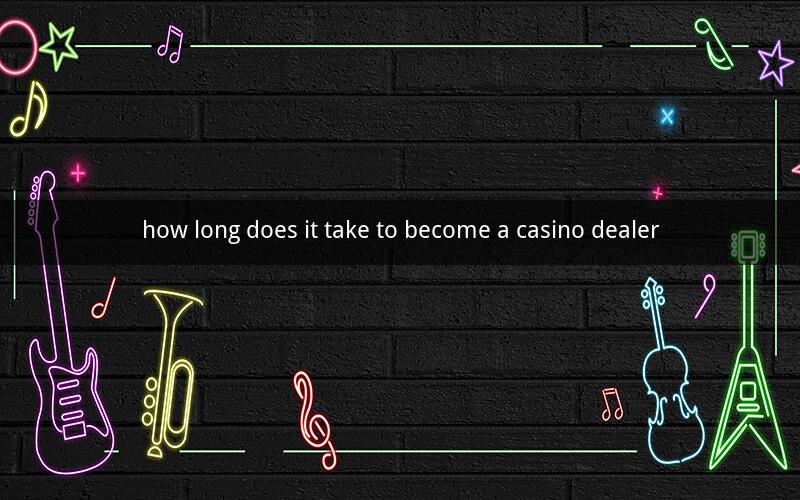
Table of Contents
1. Introduction to Casino Dealers
2. The Path to Becoming a Casino Dealer
1. Education and Training
2. Experience and Skills
3. Licensing and Certification
3. Factors Influencing the Time to Become a Casino Dealer
1. Location
2. Education Level
3. Work Experience
4. Average Timeframe to Become a Casino Dealer
5. Tips for Aspiring Casino Dealers
6. Conclusion
1. Introduction to Casino Dealers
Casino dealers play a crucial role in the gambling industry, providing a friendly and professional atmosphere for players. They are responsible for dealing cards, chips, and other gaming equipment, ensuring fair play, and maintaining the integrity of the games. Casino dealers must possess excellent communication skills, attention to detail, and the ability to handle high-pressure situations.
2. The Path to Becoming a Casino Dealer
To become a casino dealer, individuals must undergo a specific process that involves education, training, experience, and certification. Here’s a closer look at the steps involved:
2.1 Education and Training
The first step in becoming a casino dealer is to acquire the necessary education and training. While there is no specific degree required, many individuals choose to attend a casino dealer school or a community college program. These programs typically last a few months and cover topics such as:
- Basic rules and strategies for various casino games
- Customer service and communication skills
- Etiquette and professionalism in a casino environment
- Handling cash and chips
- Casino floor procedures and security measures
2.2 Experience and Skills
Once individuals have completed their education and training, they need to gain practical experience. This can be achieved by working in a casino or a simulated casino environment. Aspiring dealers often start as dealers in less lucrative games, such as roulette or blackjack, and gradually move up to more challenging positions, such as poker or craps.
To succeed as a casino dealer, individuals must possess the following skills:
- Strong attention to detail
- Excellent communication skills
- The ability to handle high-pressure situations
- Quick thinking and adaptability
- A friendly and professional demeanor
2.3 Licensing and Certification
In many jurisdictions, casino dealers are required to obtain a license or certification. The process for obtaining these credentials varies depending on the location. In some cases, dealers may need to pass a background check, drug test, and an examination. Once they have obtained their license or certification, dealers can start working in a casino.
3. Factors Influencing the Time to Become a Casino Dealer
Several factors can influence the time it takes to become a casino dealer, including:
3.1 Location
The time it takes to become a casino dealer can vary depending on the location. In areas with a high demand for dealers, individuals may be able to find employment more quickly. Conversely, in areas with a low demand, it may take longer to secure a position.
3.2 Education Level
The level of education an individual has can also impact the time it takes to become a casino dealer. Those with a formal education in gaming, hospitality, or a related field may find it easier to secure employment and advance their careers.
3.3 Work Experience
Individuals with prior experience in the gaming industry, such as working as a server or bartender, may find it easier to transition into a casino dealer position. Additionally, those with experience in customer service or a related field may have an advantage.
4. Average Timeframe to Become a Casino Dealer
The average time it takes to become a casino dealer can vary, but it generally ranges from a few months to a year. This timeline includes the time spent in education and training, as well as the time needed to gain practical experience and obtain a license or certification.
5. Tips for Aspiring Casino Dealers
Here are some tips for aspiring casino dealers to help them on their journey:
- Research the requirements for becoming a casino dealer in your desired location.
- Attend a reputable casino dealer school or program.
- Gain practical experience by volunteering or working in a casino.
- Network with industry professionals and attend job fairs.
- Develop strong communication and customer service skills.
- Stay current with industry trends and advancements.
6. Conclusion
Becoming a casino dealer requires dedication, hard work, and a passion for the industry. By following the steps outlined in this article and staying focused on their goals, aspiring dealers can successfully enter this exciting field.
Questions and Answers
1. What is the primary role of a casino dealer?
2. How many hours a week do casino dealers typically work?
3. Are there any age restrictions for becoming a casino dealer?
4. Can a casino dealer work in multiple states or countries?
5. What is the difference between a casino dealer and a pit boss?
6. How much does a casino dealer make on average?
7. Can a casino dealer play at the tables they work at?
8. Are there any health risks associated with being a casino dealer?
9. Can a casino dealer advance to other positions within the casino?
10. What is the most challenging aspect of being a casino dealer?